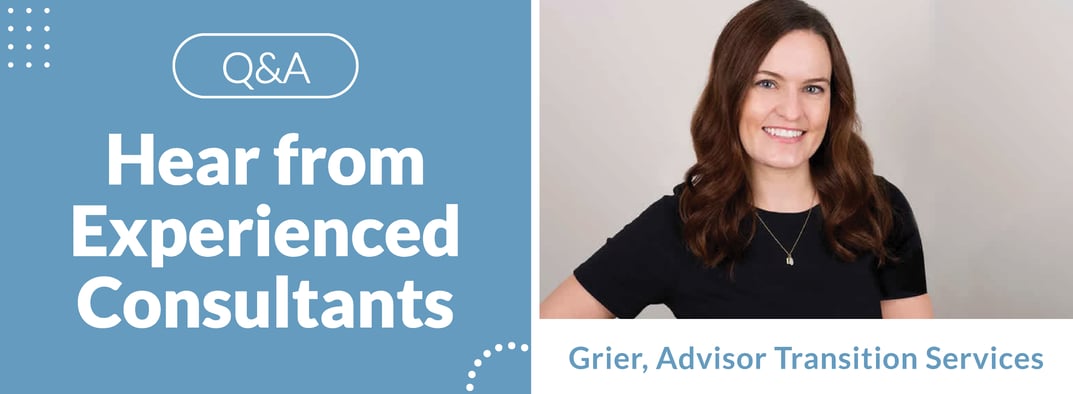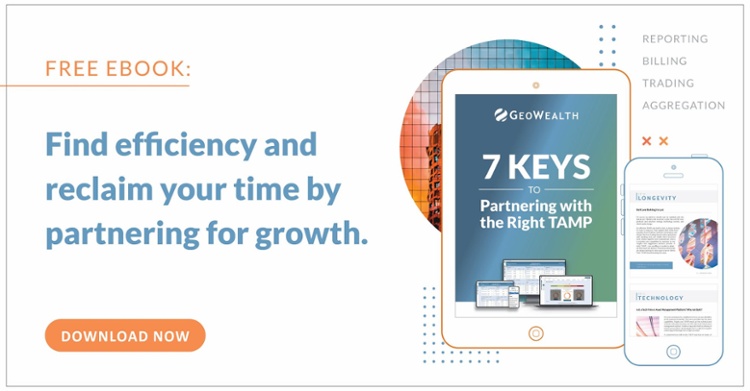GeoWealth Consultant Series: Advisor Transition Services
Breaking Away • Written by: Katie Bomher

Welcome to the GeoWealth Consultant Series! Each article will highlight a consultant, coach, or organization focused on helping independent advisors improve practice management, accelerate success, and drive growth for their business.
Advisor Transition Services
Today, we’re sitting down with Grier Rubeling, founder of Advisor Transition Services. As a consultant, Grier helps advisors navigate and understand the process of starting an RIA and assists them with the administrative and operational aspects of transitioning a current book of business.
Grier began her career as a client services associate, straight out of college, and executed her first transition with an advisor at the age of 23. After completing several transitions and acquisitions over the next decade-plus, Grier recognized that helping advisors navigate the difficulties of transitions was an unfilled need in the industry. So, in 2018, she founded Advisor Transition Services, a consultancy focused on bringing tailored transition support to advisors on the move.
(By the way, if Grier looks familiar, it may be because you’ve seen her on the Food Network! When she isn’t helping advisors through their transitions or spending time with her family, she’s creating art with food and competing in national-level gingerbread competitions.)

Let’s get to the Q&A!
Q: Tell us about how you support advisors in transition?
Grier: When I started Advisor Transition Services, it was a way to provide administrative and operational support to transitioning advisors who didn’t have their own staff. Since then, the business has evolved to include significant consulting in the due diligence and planning phases of a startup RIA. I consult with individuals and teams about:
- Starting or joining RIAs
- Assistance with data collection and preparation
- Helping teams understand what to expect before, during, and after their transitions
- Teaching them how to manage the process efficiently and track progress effectively
I also work with advisors to prepare client paperwork, develop client communication plans, and train teams on their new custodial platforms.
Q: What are the most common reasons advisors give for transitioning?
Grier: Advisors want to explore the more independent space for all types of reasons, but the general motivation for almost everyone is finding some level of flexibility and freedom that they aren’t getting at their current firm. For example, they want to approach marketing the way they think it should be done, or they’re tired of being turned down by compliance whenever they have a new idea. There is so much freedom that comes with being a small business owner, and I help people strategize on how to make that a reality.
Q: Typically speaking, what is the biggest challenge for an advisor trying to transition to a new firm?
Grier: Staffing. Either the advisor doesn’t have support staff at all, or the staff they do have is already spread thin doing the integral work of upholding normal client service while preparing the kit of communications that goes to clients upon transition. It’s often difficult for advisors to find someone on staff to act as the point person for all the administrative and organizational tasks that go into executing a successful transition. There are so many moving parts and often there isn’t someone in the office that can set aside their primary tasks to do the heavy lift on the transition project, which can take months.
Q: Are there any common mistakes advisors make during their transition period?
Grier: The two biggest mistakes I see are (1) not managing client expectations properly and (2) not asking enough questions in the preparation process.
When it comes to having conversations with clients about moving their assets to a new firm, it’s incredibly important for advisors to understand that this is likely not a five-minute conversation. Even if advisors have had strong relationships with clients for a long time, people are always wary about massive change, especially when it isn’t something they instigated themselves. They’re going to have questions, likely lots of them. They’ll want to know the reasoning, of course, and they’ll want specifics. Will they be able to access what they used to be able to access? Will they still work with the same staff? What platform will they log onto to see performance? Will their fees change? These are hard questions that take time and forethought to answer properly.
If an advisor tells a client that all they’re going to have to do is sign some paperwork for the transition to be complete, and that nothing is going to change, then the advisor is not correctly managing expectations. There’s a lot more to it, and clients need to be made aware that there’s going to be an adjustment period on their part before things get back to normal – which, by the way, is also going to be a little bit different than it was before.
This brings me to my second point. I often see advisors stop short of asking the questions they need to ask about the actual transition process. Questions for the custodian, for your lawyer, for your TAMP, for your compliance team. For example, if the business development officer at the advisor’s custodian says they’re going to be provided with an internal transition team to do everything for them, be wary. They may help significantly with the workload, but believe me when I tell you they are not going to do “everything”. Details about the process should come from the implementation and transition team. Direct your specific questions to them to gain an understanding of what the process truly involves. If anything about the transition sounds turnkey, that probably means you don’t yet have the full story, and you need to ask more questions to get a better understanding of the complexities.
Q: What should advisors considering transitioning their businesses expect that might surprise them?
Grier: There’s no single answer that will prepare an advisor for every scenario, but I will say that there will unequivocally be something that surprises you. Expect that things will pop up that you didn’t anticipate or prepare for, but that’s ok! I learn something new every time I transition a new team, and there’s always some issue that we didn’t anticipate. I coach advisors to have the mindset to just roll with it. If every little thing ruins your day, you’ll be in crisis mode all the time. Stay nimble. Stay positive. Prepare for the worst, and hope for the best.
Q: What do advisors need to know about the difference between working at a wirehouse and working as an RIA?
Grier: In a wirehouse setting, you already have some bases covered because most back-office tasks are being done for you. Compliance oversight might be overbearing, but you don’t have to set and execute policies by yourself. When you start an RIA, suddenly you have broader responsibilities, and the daunting task list that comes with launching your own small business. It really helps to have a support system, and that’s where a TAMP, a compliance consultant, and/or an OCIO can be extremely valuable. Utilizing third-parties and taking advantage of external resources allows you to take some items off your plate. Lean on other professionals and financial technologies to bring your new business to the next level and capitalize on your new upside potential.
Q: What’s your best advice for advisors thinking about breaking away?
Grier: Don’t be afraid to go for it. But do your research, ask questions (even the ones you think are “dumb”), and prepare for the unexpected. Be realistic. I’ve never met an advisor who went back to the wirehouse or IBD world after they entered the RIA channel. The only time I see them leave is to retire. The freedom and flexibility far outweigh any benefit you can get from a W2 channel. It might not be easy, but the freedom to choose and the upside potential far outweigh what extra work you might initially have to take on. It’s worth it to better control your clients’ experiences and market yourself the way you truly want to.
If you’d like to learn more about Grier and Advisor Transition Services, click here!
Read the other editions of our Consultant Series:
- Sam Kessenich of RyTech Digital Marketing
- Kelly Waltrich of Intention.ly Fintech Marketing
- Justin Watkins of Native Digital
- SEE ALL
NOTE: This is not an endorsement or testimonial of any product or service. However, GeoWealth and Grier Rubeling are parties to a referral agreement which states that Grier Rubeling will be paid a referral fee of $2,500 for each successful RIA firm referral to GeoWealth. The referral arrangement increases the likelihood that personal bias may have influenced the content and will mislead potential investors. The information provided in this article is intended for general information and educational purposes only.
See GeoWealth's Turnkey Asset Management Platform in action.
Schedule a one-on-one consultation with our team.


